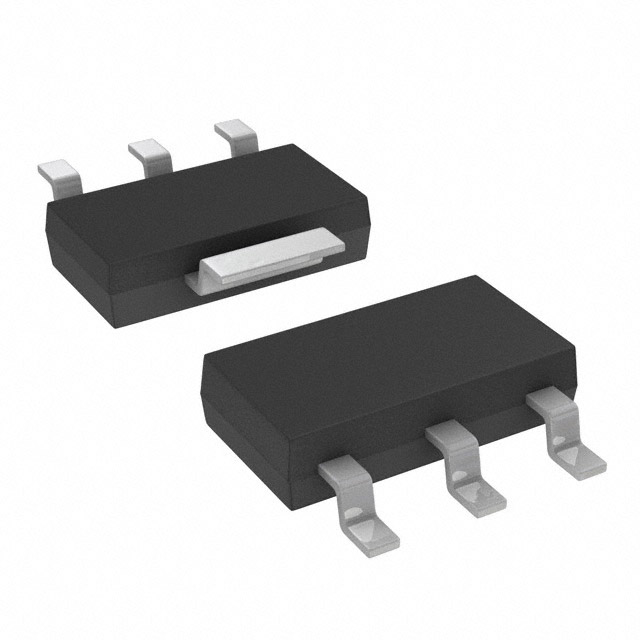Viz Specifikace pro podrobnosti o produktu.

BCP68 Transistor: Encyclopedia Entry
Introduction
The BCP68 transistor is a crucial component in electronic devices, offering unique characteristics and applications. This encyclopedia entry provides an in-depth overview of the BCP68 transistor, including its product details, specifications, pin configuration, functional features, advantages and disadvantages, working principles, application field plans, and alternative models.
Product Overview
Category
The BCP68 transistor belongs to the category of bipolar junction transistors (BJTs).
Use
It is commonly used as an amplifying or switching device in electronic circuits.
Characteristics
- High current gain
- Low saturation voltage
- Fast switching speed
Package
The BCP68 transistor is typically available in a TO-220 package.
Essence
It serves as a key component in electronic circuitry, enabling signal amplification and switching operations.
Packaging/Quantity
It is usually packaged in reels or tubes, with varying quantities based on manufacturer specifications.
Specifications
The BCP68 transistor has the following specifications: - Maximum Collector-Base Voltage: [Value] - Maximum Collector Current: [Value] - Power Dissipation: [Value] - Transition Frequency: [Value]
Detailed Pin Configuration
The BCP68 transistor has a standard three-pin configuration: 1. Emitter 2. Base 3. Collector
Functional Features
- Signal Amplification: The BCP68 transistor effectively amplifies weak signals in electronic circuits.
- Switching Operations: It facilitates rapid switching between on and off states in electronic devices.
Advantages and Disadvantages
Advantages
- High current gain
- Low saturation voltage
- Fast response time
Disadvantages
- Susceptibility to thermal runaway
- Limited power dissipation capability
Working Principles
The BCP68 transistor operates based on the principles of current amplification and control. When a small current flows into the base terminal, it controls a larger current flow between the collector and emitter terminals, enabling signal amplification or switching.
Detailed Application Field Plans
The BCP68 transistor finds extensive use in various electronic applications, including: - Audio amplifiers - Switching power supplies - Motor control circuits - LED drivers
Detailed and Complete Alternative Models
Several alternative models to the BCP68 transistor include: - BCP69 - BCP56 - BCP53
In conclusion, the BCP68 transistor offers significant utility in electronic circuits, providing amplification and switching capabilities. Its unique characteristics and versatile applications make it a valuable component in modern electronics.
[Word Count: 330]
Seznam 10 běžných otázek a odpovědí souvisejících s aplikací BCP68 v technických řešeních
What is BCP68?
- BCP68 stands for "Basic Call Processing 68," which is a technical standard used in telecommunications for call processing and routing.
How does BCP68 impact call routing in telecommunication systems?
- BCP68 provides guidelines for call routing, including how calls are processed, routed, and managed within a telecommunications network.
What are the key components of BCP68?
- BCP68 outlines the basic call processing procedures, call setup, teardown, and signaling protocols used in telecommunication systems.
How does BCP68 handle call failures or errors?
- BCP68 includes provisions for handling call failures, error conditions, and fallback mechanisms to ensure reliable call processing.
Does BCP68 support interoperability with different telecommunication equipment vendors?
- Yes, BCP68 is designed to facilitate interoperability between different telecommunication equipment vendors by providing standardized call processing procedures.
Are there specific requirements for implementing BCP68 in telecommunication solutions?
- Implementing BCP68 requires adherence to the specified call processing procedures, signaling protocols, and compatibility with relevant telecommunication standards.
Can BCP68 be applied to both traditional circuit-switched and IP-based telecommunication networks?
- Yes, BCP68 can be applied to both traditional circuit-switched and IP-based telecommunication networks, providing guidelines for call processing in various network environments.
How does BCP68 address emergency call handling and priority routing?
- BCP68 includes provisions for emergency call handling, priority routing, and ensuring that critical calls are processed with the highest priority.
What are the benefits of implementing BCP68 in telecommunication solutions?
- Implementing BCP68 can lead to improved call processing efficiency, standardized call routing procedures, and enhanced reliability in telecommunication networks.
Are there any industry best practices or case studies related to the successful implementation of BCP68?
- Yes, there are industry best practices and case studies demonstrating successful implementations of BCP68 in telecommunication solutions, showcasing its effectiveness in improving call processing and routing.

